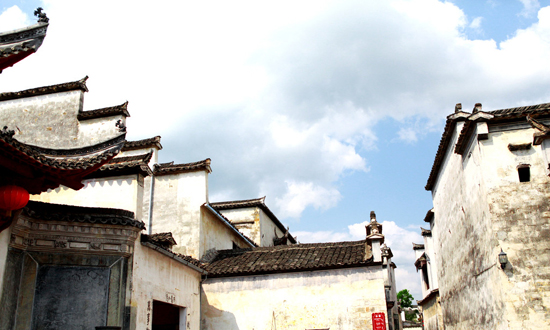We passed under a high white wall – Mrs. Zhang’s white wall – and found ourselves in the atrium of a spectacular two-story former Hui merchant residence. Paintings and calligraphy lined the walls; bonsai trees crowded the garden in the back. The bonsais had a story of their own. Mrs. Zhang’s husband, now passed away, had been a piano teacher, and his students, when short of funds, would offer him pot plants and the like in lieu of payment. Over the years he built quite a collection, and careful grooming turned many into the immaculate miniatures they are today. One of our group, who turned out to be a bonsai enthusiast, remarked, “You know, you got get over RMB 10,000 for quite a few of these if you sold up!” Mrs. Zhang turned to him and answered, “But if I sell them I won’t have them, will I ?”

Mrs. Zhang and her husband bought the residence during the “cultural revolution” for RMB 1,600. Such prices seem a trifle today, but back then, it was a big investment worth years’ salary. The old owners were rich and moved to big cities, she said. It’s a similar case with most houses on the street, she added. Old families that own residences here generally don’t live in them; “The parents are in Shanghai and the children are doing PhDs in Australia,” is how Mrs. Zhang put it.
We asked Mrs. Zhang if she had considered moving to a smaller house now that she was by herself. She could rent the Doushan house out, we added. “Rent? No, the tenants will just ruin the place,” she rebuffed with her characteristic frankness.
Heading back out onto the street, we decided it’s time to tell Mrs. Zhang that we were journalists. She didn’t seem interested. Then she revealed a secret of her own: her house is open to tourists, who fork out RMB 100 for the privilege of inspecting her house. We offered her payment, but she refused gruffly, and trundled off back inside.
As we wove our way out of Shexian Old Town, we bumped into another group of media types scouting a location for a documentary. One of them, a girl from Hefei, Anhui Province’s capital, asked me why I came to China. It’s an odd question; most people assume foreigners come here for the money, or the opportunity, or the adventure. I couldn’t come up with an answer on the spot, and she walked off. Later, I thought of what I should have said. The reason I’m in China is to visit places like Huangshan. It’s just a shame I had to leave.
We recommend:
